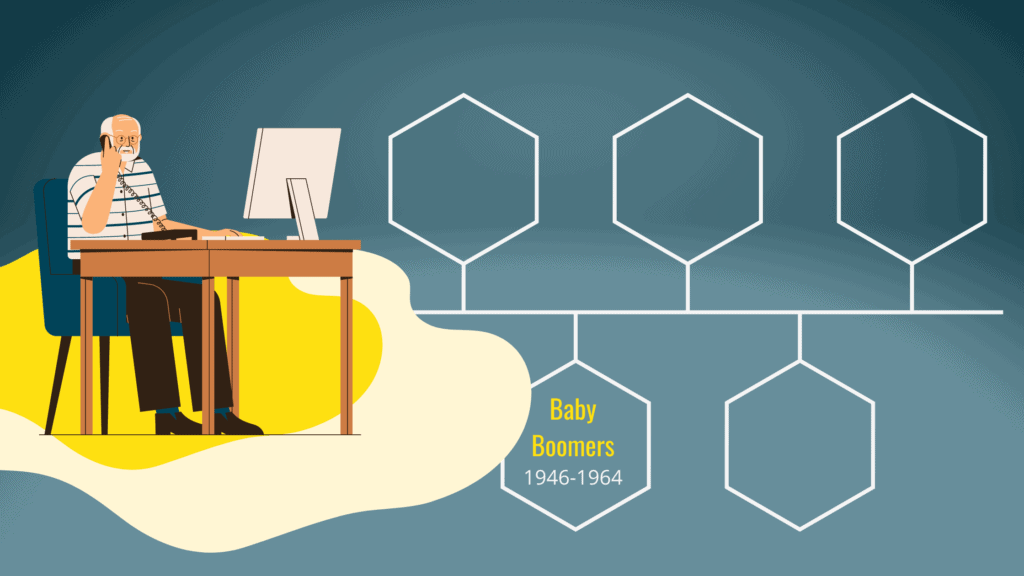Baby Boomers in the Workplace

Baby Boomers in the Workplace
Disclaimer: All of these characteristics are generalizations and by no means define each person within the age group. Rather, it’s an amalgamation of various data sources, opinions, and anecdotal evidence used to create a basic profile that simplifies the nuances of generational diversity.
Baby Boomers
Baby Boomers were born between 1946 and 1964 when post-war optimism peaked along with the economy. This sudden sense of financial security led to a sudden uptick in the number of children born, totaling 79 million new additions to American families. Despite being raised by previous generations that put enormous value on political compliance and patriotism, Baby Boomers brought about a new age of rebellion as the Vietnam War roared to life.
The past few years have seen Baby Boomers tend to be categorized as stodgy rule followers with no understanding of what it means to be a kid. Still, this generation’s young adults kindled some of America’s most transformative events, ushering in the Civil Rights Movement, the concept of “free love,” and a bustling anti-war machine deeply concerned with our social responsibility on a global level.
Broadly speaking, Baby Boomers also dove headfirst into much of the technology we’re still passionate about today, including home cinema in the form of videotapes, smaller computer hardware, video games, and plastic-based money management.
Unlike older generations, in which children were seen and not heard, Baby Boomers refused to be silenced. This trait was most poignantly reflected in the fact that this generation has the highest divorce rates and second marriages in the nation’s history, as women felt they had the means and resources to leave unhealthy relationships without risking poverty.
However, these sentiments did not necessarily extend to the workplace, where previous generations continued to encourage a more traditional hierarchical and social structure that often reflected their parents’ opinions about race, gender, and age. Because they grew up in a bygone era when corporate ladder climbing was encouraged, they adopted the nose-to-the-grindstone habits of older workers in an effort to remain competitive in the fields.
Other names include the “Me” Generation. They currently make up 25% of today’s workforce.
Common Traits
- Goal-oriented
- Optimistic
- Risk-takers
- Genuine belief in the American Dream
- Personal growth and gratification
- Frivolity in financial matters and succession planning
- Ambitious
- Questioning and curious
- Work ethic is the key to success
- Money is a sign of personal achievement and ability
- Ethical and politically correct
- Openly talking about feelings and perspectives is a valuable tool at work and at home.
Values
- Success in the form of net worth
- Work comes first, often by sacrificing other aspects of life
- Accomplishments deserve acknowledgment
- Efficiency
- Collaboration
- Drive
- Involvement
- Change
- Creativity
Workplace Expectations
- Clearly defined role guidelines
- Opportunities to advance through merit and seniority
- Commitment and loyalty are rewarded
- Exciting projects, both independent and collaborative
- Competition abounds
- A chance to mentor younger generations working alongside them
- Flexible retirement plans that allow them to still get involved on a part-time or consultatory basis
Ideal Work Environment
- Robust support and resources for job-related skills training
- Open-forum-style meetings that allow them to share their expertise
- Plenty of “face time” with business leaders
- Values acknowledgment over feedback
- Follows established practices and processes
Strengths
- Eager to get hands-on and assume responsibility
- Insightful, empathetic communication styles
- Risk-takers that are willing to challenge authority and convention
- Independence and a “get it done at all costs” attitude
Weaknesses
- They may struggle in a multigenerational workplace where younger generations come in, do their job, then go home rather than define their lives by their careers.
- Preference for more traditional methods like in-office work over remote and formalized meetings over emails.
- Could press the more introverted social boundaries of Millennials and Gen Z in an attempt to build relationships
- Overly optimistic attitudes clash with realistic/cynical attitudes